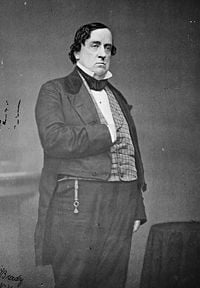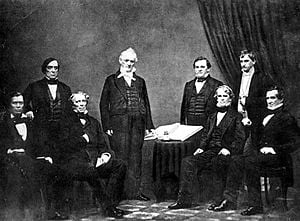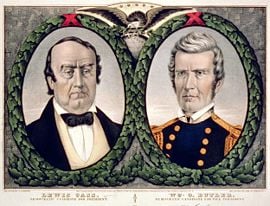Difference between revisions of "Lewis Cass" - New World Encyclopedia
(→References: added Soylent Communications) |
Laura Brooks (talk | contribs) |
||
| Line 3: | Line 3: | ||
| image=Cass standing-right.jpg | | image=Cass standing-right.jpg | ||
| order=14th | | order=14th | ||
| − | | title=United States Secretary of War | + | | title=[[United States Secretary of War]] |
| term_start=August 1, 1831 | | term_start=August 1, 1831 | ||
| term_end=October 5, 1836 | | term_end=October 5, 1836 | ||
| − | | predecessor=John Henry Eaton | + | | predecessor=[[John Henry Eaton]] |
| − | | successor=Joel Roberts Poinsett | + | | successor=[[Joel Roberts Poinsett]] |
| order2=22nd | | order2=22nd | ||
| − | | title2=United States Secretary of State | + | | title2=[[United States Secretary of State]] |
| term_start2=March 6, 1857 | | term_start2=March 6, 1857 | ||
| term_end2=December 14, 1860 | | term_end2=December 14, 1860 | ||
| − | | predecessor2=William L. Marcy | + | | predecessor2=[[William L. Marcy]] |
| − | | successor2=Jeremiah S. Black | + | | successor2=[[Jeremiah S. Black]] |
| birth_date=October 9, 1782 | | birth_date=October 9, 1782 | ||
| − | | birth_place=Exeter, New Hampshire, [[United States| | + | | birth_place=[[Exeter, New Hampshire]], [[United States|USA]] |
| − | | death_date= | + | | death_date={{death date and age|1866|06|17|1782|10|09}} |
| − | | death_place=Detroit, Michigan, [[United States| | + | | death_place=[[Detroit, Michigan]], [[United States|USA]] |
| − | | party=Democratic | + | | party=[[Democratic Party (United States)|Democratic]] |
| spouse=Eliza Spencer Cass | | spouse=Eliza Spencer Cass | ||
| − | | profession=[[Lawyer]] | + | | profession=[[Politician]], [[Lawyer]] |
| + | | signature=Casssig.jpg | ||
}} | }} | ||
| − | '''Lewis Cass''' (October 9, 1782 – June 17, 1866) was an [[United States|American]] military officer and politician. He was the nominee of the Democratic Party for [[President of the United States]] in 1848 | + | '''Lewis Cass''' (October 9, 1782 – June 17, 1866) was an [[United States|American]] military officer and [[politician]]. He was the nominee of the [[Democratic Party (United States)|Democratic Party]] for [[President of the United States]] in 1848. |
==Early life== | ==Early life== | ||
| − | + | He was born in [[Exeter, New Hampshire]], where he attended [[Phillips Exeter Academy]]. | |
| − | + | During the [[War of 1812]], he served as brigadier general fighting at the [[battle of the Thames]]. As a reward for his service in the war, he was appointed [[Governor]] of the [[Michigan Territory]] by President [[James Madison]] on October 29, 1813, and served until 1831. He was frequently absent, and several territorial secretaries often served as acting governor in his place. | |
| + | In 1820, he led an expedition to the northern part of the territory, in the northern [[Great Lakes]] region in present-day northern [[Minnesota]], in order to map the region and discover the source of the [[Mississippi River]]. The source of the river had been unknown until then, resulting in an undefined border between the United States and [[United Kingdom|Britain]]. The expedition erroneously identified [[Cass Lake (Minnesota)|Cass Lake]] as the source of the river. The source of the river was correctly identified in 1832 by [[Henry Schoolcraft]], who had been Cass's expedition geologist, as nearby [[Lake Itasca]]. | ||
| + | |||
| + | [[Image:Buchanan Cabinet.jpg|thumb|left|300px|''President Buchanan and his Cabinet''<br/>From left to right: [[Jacob Thompson]], Lewis Cass, [[John B. Floyd]], [[James Buchanan]], [[Howell Cobb]], [[Isaac Toucey]], [[Joseph Holt]] and [[Jeremiah S. Black]], (c. 1859)]] | ||
==Political career== | ==Political career== | ||
| − | + | On August 1, 1831, he resigned as governor of the Michigan Territory to take the post of [[United States Secretary of War|Secretary of War]] under President [[Andrew Jackson]], serving until 1836. Cass was a central figure in formulating and implementing the [[Indian Removal]] policy of the Jackson administration. From 1836 to 1842, he was [[Ambassador (diplomacy)|ambassador]] to [[France]]. | |
| − | |||
| − | |||
| − | |||
| − | |||
| − | |||
| − | |||
| − | |||
| − | |||
| − | |||
| − | |||
| − | |||
| − | On August 1, 1831, | ||
| − | |||
| − | |||
| − | |||
| − | |||
| − | |||
| − | From | ||
| − | |||
| − | |||
| − | |||
| − | |||
| − | |||
| − | |||
| − | |||
| − | |||
| − | |||
| − | |||
| − | + | Cass represented [[Michigan]] in the [[United States Senate]] from 1845 to 1848. He served as chairman of the [[United States House Committee on Military Affairs|Committee on Military Affairs]] in the [[30th United States Congress|30th Congress]]. In 1848, he resigned from the Senate to run for President. [[William Orlando Butler]] was his running mate. Cass was a leading supporter of the [[Doctrine of Popular Sovereignty]], which held that the people who lived in a territory should decide whether or not to permit [[slavery]] there. His nomination caused a split in the Democratic party, leading many antislavery Democrats to join the [[United States Free Soil Party|Free Soil Party]]. He also supported the annexation of [[Texas]]. | |
| − | |||
[[Image:Cass Butler campaign.jpg|thumb|right|270px|Cass/Butler campaign poster]] | [[Image:Cass Butler campaign.jpg|thumb|right|270px|Cass/Butler campaign poster]] | ||
| + | After losing [[U.S. presidential election, 1848|the election]] to [[Zachary Taylor]], he returned to the Senate, serving from 1849 to 1857. He was the first non-incumbent [[List of United States Democratic Party presidential tickets|Democratic presidential candidate]] to lose election. | ||
| + | From 1857 to 1860, Cass served as [[United States Secretary of State|Secretary of State]] under President [[James Buchanan]]. He resigned on December 13, 1860, reportedly disgusted by Buchanan's failure to pursue a stronger policy that might have averted the threatened secession of southern states. | ||
| − | + | He died in 1866 and is buried in [[Elmwood Cemetery (Detroit, Michigan)|Elmwood Cemetery]] in Detroit. | |
| − | + | A statue of Cass is one of the two that was submitted by Michigan to the [[National Statuary Hall]] collection in the [[U.S. Capitol]] in [[Washington, D.C]]. It stands in the National Statuary Hall room. (The other statue is of [[Zachariah Chandler]], which is in the Hall of Columns.) | |
| − | |||
| − | |||
| − | |||
| − | |||
| − | + | ==External links== | |
| − | |||
| − | |||
| − | + | *[http://www.army.mil/cmh-pg/books/sw-sa/Cass.htm Secretaries of War and Secretaries of the Army] Retrieved June 16, 2007. | |
| − | |||
| − | |||
| − | |||
| − | |||
| − | |||
| − | |||
| − | |||
| − | |||
| − | |||
| − | |||
| − | |||
| − | |||
| − | |||
| − | |||
| − | |||
| − | |||
{{start box}} | {{start box}} | ||
{{succession box | {{succession box | ||
| − | | title=Territoral Governor of Michigan | + | | title=[[Governors of Michigan Territory|Territoral Governor of Michigan]] |
| − | | before=William Hull | + | | before=[[William Hull]] |
| − | | after=George Bryan Porter | + | | after=[[George Bryan Porter]] |
| years=1813 – 1831}} | | years=1813 – 1831}} | ||
{{succession box | {{succession box | ||
| − | | title=United States Secretary of War | + | | title=[[United States Secretary of War]] |
| − | | before=John Henry Eaton | + | | before=[[John Henry Eaton]] |
| − | | after=Joel Roberts Poinsett | + | | after=[[Joel Roberts Poinsett]] |
| years=August 1, 1831 – October 5, 1836}} | | years=August 1, 1831 – October 5, 1836}} | ||
{{succession box | {{succession box | ||
| − | | title=U.S. | + | | title=[[United States Ambassador to France|U.S. Minister to France]] |
| − | | before=Edward Livingston | + | | before=[[Edward Livingston]] |
| − | | after=William R. King | + | | after=[[William R. King]] |
| years=October 4, 1836 – November 12, 1842}} | | years=October 4, 1836 – November 12, 1842}} | ||
| − | {{ | + | {{U.S. Senator box |
| − | |||
| state=Michigan | | state=Michigan | ||
| class=1 | | class=1 | ||
| − | | before=Augustus S. Porter | + | | before=[[Augustus S. Porter]] |
| − | | after=Thomas Fitzgerald | + | | after=[[Thomas Fitzgerald]] |
| − | | years=March 4, 1845 – May 29, 1848 | + | | alongside=[[William Woodbridge]] and [[Alpheus Felch]] |
| − | + | | years=March 4, 1845 – May 29, 1848}} | |
{{succession box | {{succession box | ||
| − | | title=Democratic Party presidential candidate | + | | title=[[List of United States Democratic Party presidential tickets|Democratic Party presidential candidate]] |
| before=[[James K. Polk]] | | before=[[James K. Polk]] | ||
| after=[[Franklin Pierce]] | | after=[[Franklin Pierce]] | ||
| − | | years=1848 (lost)}} | + | | years=[[U.S. presidential election, 1848|1848]] (lost)}} |
| − | {{ | + | {{U.S. Senator box |
| state=Michigan | | state=Michigan | ||
| − | |||
| class=1 | | class=1 | ||
| − | | before=Thomas Fitzgerald | + | | before=[[Thomas Fitzgerald]] |
| − | | after=Zachariah Chandler | + | | after=[[Zachariah Chandler]] |
| − | | years=January 20, 1849 – March 3, 1857 | + | | alongside=[[Alpheus Felch]] and [[Charles E. Stuart]] |
| − | + | | years=January 20, 1849 – March 3, 1857}} | |
{{succession box | {{succession box | ||
| − | | title=President ''pro tempore'' of the United States Senate | + | | title=[[President pro tempore of the United States Senate|President ''pro tempore'' of the United States Senate]] |
| − | | before=David Rice Atchison | + | | before=[[David Rice Atchison]] |
| years=December 4, 1854 | | years=December 4, 1854 | ||
| − | | after=Jesse D. Bright}} | + | | after=[[Jesse D. Bright]]}} |
{{succession box | {{succession box | ||
| − | | title=United States Secretary of State | + | | title=[[United States Secretary of State]] |
| − | | before=William L. Marcy | + | | before=[[William L. Marcy]] |
| − | | after=Jeremiah S. Black | + | | after=[[Jeremiah S. Black]] |
| years=March 6, 1857 – December 14, 1860}} | | years=March 6, 1857 – December 14, 1860}} | ||
{{end box}} | {{end box}} | ||
| − | [[Category:History and | + | |
| + | [[Category:History and Biography]] | ||
[[Category:Biography]] | [[Category:Biography]] | ||
| + | [[Category:Politics and social sciences]] | ||
| + | [[Category:History of the United States]] | ||
| − | {{credit| | + | {{credit|138460798}} |
Revision as of 16:52, 16 June 2007
| Lewis Cass | |
 | |
14th United States Secretary of War
| |
| In office August 1, 1831 – October 5, 1836 | |
| Preceded by | John Henry Eaton |
|---|---|
| Succeeded by | Joel Roberts Poinsett |
22nd United States Secretary of State
| |
| In office March 6, 1857 – December 14, 1860 | |
| Preceded by | William L. Marcy |
| Succeeded by | Jeremiah S. Black |
| Born | October 9, 1782 Exeter, New Hampshire, USA |
| Died | June 17 1866 (aged 83) Detroit, Michigan, USA |
| Political party | Democratic |
| Spouse | Eliza Spencer Cass |
| Profession | Politician, Lawyer |
| Signature | |
Lewis Cass (October 9, 1782 – June 17, 1866) was an American military officer and politician. He was the nominee of the Democratic Party for President of the United States in 1848.
Early life
He was born in Exeter, New Hampshire, where he attended Phillips Exeter Academy.
During the War of 1812, he served as brigadier general fighting at the battle of the Thames. As a reward for his service in the war, he was appointed Governor of the Michigan Territory by President James Madison on October 29, 1813, and served until 1831. He was frequently absent, and several territorial secretaries often served as acting governor in his place.
In 1820, he led an expedition to the northern part of the territory, in the northern Great Lakes region in present-day northern Minnesota, in order to map the region and discover the source of the Mississippi River. The source of the river had been unknown until then, resulting in an undefined border between the United States and Britain. The expedition erroneously identified Cass Lake as the source of the river. The source of the river was correctly identified in 1832 by Henry Schoolcraft, who had been Cass's expedition geologist, as nearby Lake Itasca.

From left to right: Jacob Thompson, Lewis Cass, John B. Floyd, James Buchanan, Howell Cobb, Isaac Toucey, Joseph Holt and Jeremiah S. Black, (c. 1859)
Political career
On August 1, 1831, he resigned as governor of the Michigan Territory to take the post of Secretary of War under President Andrew Jackson, serving until 1836. Cass was a central figure in formulating and implementing the Indian Removal policy of the Jackson administration. From 1836 to 1842, he was ambassador to France.
Cass represented Michigan in the United States Senate from 1845 to 1848. He served as chairman of the Committee on Military Affairs in the 30th Congress. In 1848, he resigned from the Senate to run for President. William Orlando Butler was his running mate. Cass was a leading supporter of the Doctrine of Popular Sovereignty, which held that the people who lived in a territory should decide whether or not to permit slavery there. His nomination caused a split in the Democratic party, leading many antislavery Democrats to join the Free Soil Party. He also supported the annexation of Texas.
After losing the election to Zachary Taylor, he returned to the Senate, serving from 1849 to 1857. He was the first non-incumbent Democratic presidential candidate to lose election.
From 1857 to 1860, Cass served as Secretary of State under President James Buchanan. He resigned on December 13, 1860, reportedly disgusted by Buchanan's failure to pursue a stronger policy that might have averted the threatened secession of southern states.
He died in 1866 and is buried in Elmwood Cemetery in Detroit.
A statue of Cass is one of the two that was submitted by Michigan to the National Statuary Hall collection in the U.S. Capitol in Washington, D.C. It stands in the National Statuary Hall room. (The other statue is of Zachariah Chandler, which is in the Hall of Columns.)
External links
- Secretaries of War and Secretaries of the Army Retrieved June 16, 2007.
| Preceded by: William Hull |
Territoral Governor of Michigan 1813 – 1831 |
Succeeded by: George Bryan Porter |
| Preceded by: John Henry Eaton |
United States Secretary of War August 1, 1831 – October 5, 1836 |
Succeeded by: Joel Roberts Poinsett |
| Preceded by: Edward Livingston |
U.S. Minister to France October 4, 1836 – November 12, 1842 |
Succeeded by: William R. King |
| Preceded by: Augustus S. Porter |
United States Senator (Class 1) from Michigan March 4, 1845 – May 29, 1848 |
Succeeded by: Thomas Fitzgerald |
| Preceded by: James K. Polk |
Democratic Party presidential candidate 1848 (lost) |
Succeeded by: Franklin Pierce |
| Preceded by: Thomas Fitzgerald |
United States Senator (Class 1) from Michigan January 20, 1849 – March 3, 1857 |
Succeeded by: Zachariah Chandler |
| Preceded by: David Rice Atchison |
President pro tempore of the United States Senate December 4, 1854 |
Succeeded by: Jesse D. Bright |
| Preceded by: William L. Marcy |
United States Secretary of State March 6, 1857 – December 14, 1860 |
Succeeded by: Jeremiah S. Black |
Credits
New World Encyclopedia writers and editors rewrote and completed the Wikipedia article in accordance with New World Encyclopedia standards. This article abides by terms of the Creative Commons CC-by-sa 3.0 License (CC-by-sa), which may be used and disseminated with proper attribution. Credit is due under the terms of this license that can reference both the New World Encyclopedia contributors and the selfless volunteer contributors of the Wikimedia Foundation. To cite this article click here for a list of acceptable citing formats.The history of earlier contributions by wikipedians is accessible to researchers here:
The history of this article since it was imported to New World Encyclopedia:
Note: Some restrictions may apply to use of individual images which are separately licensed.
